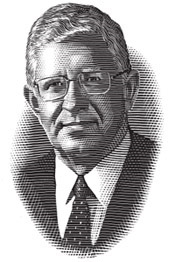|
||
      |
From the President: The real bottom line
President Don M. Randel takes issue with the results of a survey on how college and university presidents spend their time.
 In
early November the Chronicle of Higher Education published a survey
of college and university presidents under the headline “What Presidents
Think.” It is more nearly a survey of what college presidents do (or
have done), perhaps with the vague implication that they do not much think
at all. The article begins, “While the job of college president is
often still filled by former provosts, their top priority these days is
more akin to that of a chief financial officer: a balanced budget.”
The lead paragraph concludes, “When asked to rate their level of concern
about 29 issues their institutions may face, the issues at the top of the
list all affect the bottom line in some way: rising tuition, increasing
health-care costs, inadequate faculty salaries, and student retention.”
In
early November the Chronicle of Higher Education published a survey
of college and university presidents under the headline “What Presidents
Think.” It is more nearly a survey of what college presidents do (or
have done), perhaps with the vague implication that they do not much think
at all. The article begins, “While the job of college president is
often still filled by former provosts, their top priority these days is
more akin to that of a chief financial officer: a balanced budget.”
The lead paragraph concludes, “When asked to rate their level of concern
about 29 issues their institutions may face, the issues at the top of the
list all affect the bottom line in some way: rising tuition, increasing
health-care costs, inadequate faculty salaries, and student retention.”
Like most such surveys, this is a rather blunt instrument. For a start, it lumps together public and private, denominational and nondenominational, four-year and doctoral institutions. The range of their financial conditions is vast, and some are indeed rather close to the edge. Thus, for some schools, student retention is a matter of survival. At Chicago, student retention is a very serious matter on which we have made significant improvements, but it is not at all about money.
Perhaps the most misleading aspect of the results—or of how the results are presented—derives from a too narrow definition of financial concerns in general and of fund-raising in particular. Every human organization, whether it is a family or a business or a university, can to a degree be defined in economic terms. But that does not mean money is necessarily what matters most to that organization. Similarly, every organization concerned about long-term survival must ensure that it has a “balanced budget.” And although the poor will think about this in different ways from the rich, money is only as valuable as the things one spends it on, which is to say, the things for which the organization stands. Hence, the real concern is what we stand for and how we deploy whatever resources we have in its support. Since at the University of Chicago we believe that we create great value for society, we would naturally like to enhance our resources to create still greater value for society. But we know that we must live within our means if we are to continue to serve society over spans of time measured not in decades but in centuries.
So, do I worry most about a balanced budget, and do I spend all of my time on fund-raising? I do not worry about a balanced budget because I simply assume we will have one. At Chicago, the division of labor is somewhat different from what the survey’s results imply. It is the job of the provost, with the close collaboration of the chief financial officer, to deliver the best possible academic programs within the resources available. It is my job to help deliver to the provost the maximum amount of resources for the purpose.
Well, then, do I spend all of my time fund-raising? Certainly not—if what one means is asking people for money. The president’s job is to help create an environment in which the work of faculty and students can flourish, an environment of commitment to inquiry and the power of ideas for the benefit of all. A part of the job is to articulate that commitment to the community itself and to those who do or might support the University’s goals. Thus, the job of fund-raising is to help create the conditions under which someone might say yes if asked for money.
It comes down to our abiding belief that ideas matter. In part they matter because good ideas will command the resources to support them. Absent good ideas, no one will say yes if asked—and why would one want to be in the business of asking? What, then, is my contribution to the creation of these good ideas that really matter? In the first instance, it is to recruit and support the academic leadership that can best deliver on the University’s commitment across all of the fields in which we are engaged. That means knowing these leaders, being extremely curious and concerned about the work they lead, and caring deeply about their success.
In my early days here, the Sun-Timesdescribed me as “scholar, diplomat, salesman.” Not bad for a three-word account of of the job in general, especially here. It’s not only or even mostly about money. It’s about what money is good for.